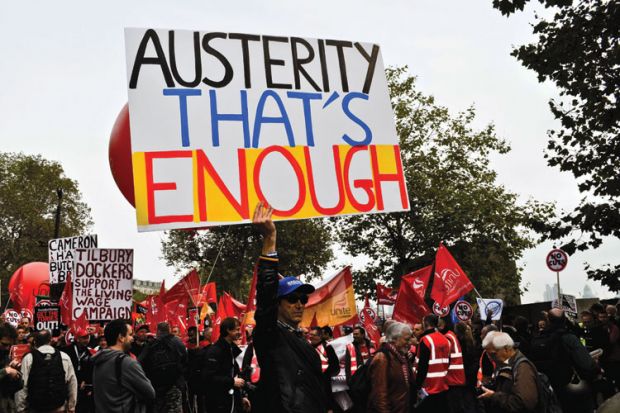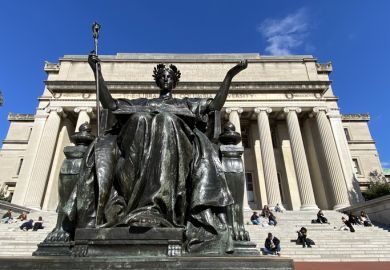With George Osborne firmly ensconced in 11 Downing Street and economies around the world remaining fragile in the wake of the global financial crisis, austerity looks to be here to stay.
It seems only right, therefore, that researchers focus their efforts on the study of austerity, and the impact that it has on societies.
Enter De Montfort University’s Centre for Urban Research on Austerity, thought to be the first academic centre dedicated to the study of austerity in the UK, if not the world.
Launched last month, the centre aims to bring together academics and activists to examine the politics of austerity, and its impact in global cities.
Jonathan Davies, professor of critical policy studies at De Montfort, said that the state of global economies meant that the centre – which he directs – would be “in business” for a while to come.
“The main benefit will be to create a pole of attraction for people who want to understand how governments and societies respond to crisis and austerity,” said Professor Davies. “We want to be a vehicle for learning, knowledge exchange and comparison.”
The centre will have a global focus, and its first major project is an Economic and Social Research Council-funded examination of governance in times of austerity in eight cities across the developed world.
Among the questions being looked at by this project is one that is familiar in the UK: are we really, in the words of David Cameron, “all in this together”? But, as with much of the centre’s approach, the focus is not on the economics of austerity, but on the politics of it: have decision-makers become more remote in hard times, or more inclusive? Does the sort of community-led collaboration envisaged in ideas such as the prime minister’s “Big Society” depoliticise austerity, or actually politicise it?
But the aim is that the centre will go far beyond the immediate consequences of austerity to consider a much wider range of issues, for example, around the transformation of public services, community resilience in a time of crisis, and protests against spending cuts.
The use of the term austerity in the centre’s title, said Professor Davies, was in effect “a form of provocation”, allowing the centre to join up a whole range of related issues.
Indeed, one of the topics that the centre hopes to examine is what austerity actually means in different cultures around the world, and through time.
“We tend to think that it has quite negative connotations,” explains Professor Davies. “But, certainly, if you look back in history, it has more positive connotations, about frugality and abstinence.”
One thing that is certain is that the centre will have a focus on the urban implications of austerity, and Professor Davies said that this was a purposeful decision.
Leicester, where De Montfort is located, provides an important case study as a city that faces significant challenges, particularly around welfare spending, but also as a place where the local authority has managed to avoid a sense of crisis, said Professor Davies.
It is one of the cities being studied as part of the ESRC-funded project, alongside urban areas such as Dublin, Athens and, further afield, Baltimore and Melbourne.
“Cities are places where cuts are passed down, places of social innovation and protest, and we know from research already that the way austerity affects cities can be very different, even if the economic conditions are roughly similar,” Professor Davies said. “The intuition is that the way government and society is organised at an urban level has an impact on what happens when austerity hits.”
As well as giving a voice to those who are affected by austerity, and analysing the consequences of such policies, Professor Davies hopes that the centre’s comparative approach will allow it to have a significant impact on policy debates around the world.
“There are different circumstances and different impacts, but common challenges; I think the challenges we see of governing austerity are very similar,” he said. “They are different in degree and different in intensity, and some of the responses that we see on the ground are different, but nevertheless there are common reference points and common challenges,” he said, adding that the centre could be used as a vehicle to exchange ideas about these concerns.
In numbers
8 – the number of cities in the developed world that the centre will look at in its first major study
Campus news
Glasgow Caledonian University
A study at Glasgow Caledonian University has highlighted the role that alcohol plays in the lives of lesbian, gay, bisexual and transgender people in Scotland. The research found that many LGBT people described drinking heavily when they first “came out” and encountered the commercial gay scene, and there was an expectation that they would continue to drink more heavily in this environment than in other contexts as they aged. Many interviewees complained that alcohol support services did not provide a safe or welcoming space for LGBT people.
University of Huddersfield
A project looking at combating some of the worst effects of malaria in Africa has earned a doctoral student funding from a global foundation. Folashade Ogunrinade, a PhD candidate at the University of Huddersfield, has received funding from the Schlumberger Foundation, a non-profit organisation that focuses on science education, to aid her work. The main objective of Ms Ogunrinade’s research is to identify and isolate compounds in some common African plants so that they can be used for the treatment of cerebral malaria, which affects some 575,000 people annually.
Nottingham Trent University
A campus has undergone a multimillion-pound development, with the creation of new teaching and learning facilities and social space. The transformation at Nottingham Trent University’s Clifton campus includes two new buildings – the Pavilion, which includes enclosed learning “pods” and booths for collaborative study, and the Teaching and Learning building, which accommodates up to 800 students in three lecture theatres and 10 teaching rooms.
Cardiff University
Modern foreign language undergraduates will be signed up to mentor and coach pupils at Welsh secondary schools in a project led by Cardiff University. The initiative, which also involves Swansea, Bangor and Aberystwyth universities, is aimed at turning around a significant decline in the number of children taking language GCSEs in Wales. The Welsh government is funding the project.
University of Sunderland
Research is exposing the diagnostic failings by healthcare professionals in HIV cases. Silent Scream? The Life Histories of People Living with HIV in the North East of England, a project by Drew Dalton, lecturer in social sciences at the University of Sunderland, has detailed patients’ worrying experiences with GPs including a common failure to offer testing, or misdiagnosis, even in late stages of HIV. “The research is vital to understanding what it means to live with HIV in the UK today,” Mr Dalton said.
Loughborough University
Verbal abuse towards football referees is still rife, according to a survey. Just over half the 2,000 respondents felt that the Football Association’s Respect campaign, which was launched in 2008 to get managers, players and fans to show more respect to officials, had been a success. However, 60 per cent reported being verbally abused at least every couple of games, while one in five said that they suffered physical abuse. The study was compiled by researchers at Loughborough, Portsmouth and Edge Hill universities and targeted referees from England, the Isle of Man, Jersey and Guernsey.
Soas, University of London
A giant glass roof has been erected above a university quad in central London. The final panel of the roof in the £5 million project to create a glass-covered atrium at the University of London’s Senate House was fitted last month. The project is funded by a £20 million gift from the Alphawood Foundation Chicago to Soas, University of London, and will create a “student social and learning hub” on Senate House’s North Block, to be named the Fred Eychaner Atrium.
University of Birmingham
Sajid Javid, the business secretary, has opened a cryogenic energy storage pilot facility, that uses “liquid air” to store and provide power that could transform future energy systems. The new facility, at the University of Birmingham, is the UK’s first dedicated research facility for energy storage using cryogenic liquids, comprising new laboratories, equipment and a major demonstration plant. Liquid air could revolutionise the way that energy is stored, ensuring that power is available when it is most needed, the university said.
POSTSCRIPT:
Print headline: Impact of ‘austerity politics’ to be gauged in global cities
Register to continue
Why register?
- Registration is free and only takes a moment
- Once registered, you can read 3 articles a month
- Sign up for our newsletter
Subscribe
Or subscribe for unlimited access to:
- Unlimited access to news, views, insights & reviews
- Digital editions
- Digital access to THE’s university and college rankings analysis
Already registered or a current subscriber? Login




